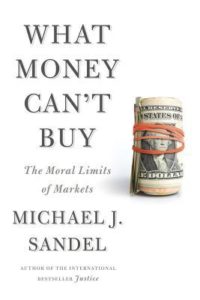
Why and in what ways do people decide to read a certain book? It might be a recommendation from a friend, written by an acclaimed author, or even an attention-grabbing book cover. In my case, it was an intriguing title – and a little help from my librarian- wife, who brought home the book What Money Can’t Buy: The Moral Limits of Markets (2012) by Michel Sandel, the Bass Professor of Government at Harvard University.
Throughout this book, Sandel talks about the morals and ethics of certain market transactions. Sandel claims that markets “are not mere mechanisms” but that they “embody certain norms”. Prof. Sandel’s prior book entitled Justice: What’s the Right Thing to Do? (2008) has been apparently an international bestseller (disclaimer: I have not read Justice). In this more recent book, Sandel describes a variety of market transactions that he presumably finds objectionable. Examples include paying for: a prison cell upgrade, the services of a Indian surrogate mother to deliver a child, the right to emit a metric ton of carbon, and the right to shoot an endangered black rhino, to name a few.
His objection toward overreach of markets rests on two pillars. The first is inequality (what he calls fairness). In a world where money has come to have more and more importance – buying political influence, good medical care, access to elite schools – income distribution becomes even more important. His second argument is corruption. He claims that markets can be corrosive, in that putting a price on a good thing can corrupt that very thing. He cites examples such as paying kids to read books or hiring foreign mercenaries to fight our wars. However, on what basis would he suggest a society determine ‘fairness’? Or how would we agree on what is a corrupting influence? Sandel fails to provide a response to these type of questions. Instead, he uses example after example to serve as his argumentation. Furthermore, Sandel does not attempt to provide any possible solutions to what he suggests is an endemic problem.
At one juncture, he asks whether kidneys should be bought and sold. He states two arguments against a ‘kidney market’: i) this type of market would prey upon the poor (the fairness argument), and ii) this type of market promotes a degrading, objectifying view of the human person (the corruption argument). But what about the fact that there is a very long wait for kidneys in the U.S., perhaps in large part because kidneys can only be donated and the donor cannot receive any monetary compensation? [Data indicates that over 95,000 people in the US are on a waitlist for a kidney transplant {https://optn.transplant.hrsa.gov/data/}]. Is there not a moral argument that people’s free choice is being constrained, and that the health of many individuals on dialysis are compromised because a market is not allowed to develop for kidneys? This is in addition to the economic argument of the high federal Medicare cost of dialysis (see video for more info).
He spends much of his last chapter talking about the business of sport and how dramatically it has changed since the 1960s when he was growing up in Minneapolis. He decries the naming of stadiums, the existence of skyboxes in stadiums (his squabble: the presence of skyboxes presents fewer opportunities where people of different walks of life can encounter one another) and that autographs are bought and sold. He further laments that beaches and subway stations are sponsored or named for corporations, and that ads placed in almost every imaginable space (restroom walls, logos tattooed on bodies, a couple expecting a son putting their boy’s name up for bid online – no company met their $500,000 asking price). Some of the examples he uses seem rather peculiar. Indeed, it feels (at least to this reader) that Sandel argues from the extreme to make his point.
In another fascinating section, the author talks about a North Carolina based organization that offered drug-addicted women $300 cash for sterilization or long-term birth control. This program, launched in 1997, was criticized as “a bribe for sterilization”; other arguments suggest that it is a coercive act. While my point is not to weigh in on the arguments for or against this particular transaction, I find Sandel’s concluding statements in this area most intriguing. Quoting his work (p.47),” …in order to determine whether a woman’s reproductive capacity should be subject to a market transaction, we have to ask what kind of good it is: Should we regard our bodies as possessions that we own and dispose of as we please, or do some uses of our bodies amount to self-degradation? This is a large and controversial question that also arises in debates about prostitution, surrogate motherhood, and the buying and selling eggs and sperm (italics added).” I wonder if he would extend the “own and dispose” argument to the issue of abortion as well.
Sandel admittedly is not an economist. He does refer several times to comments from his colleague Greg Mankiw, an economist at Harvard. [Full disclosure: we use Mankiw’s books in our University’s Microeconomics and Macroeconomics classes. I have found Mankiw’s Micro textbook to be well-reasoned and understandable to college students.] I believe an economist’s dialogue with Sandel’s ideas would illumine and improve the quality of this book.
So, what do you think about moral limits of markets?
 Bert Wheeler
Bert Wheeler
 Jeff Haymond
Jeff Haymond
 Marc Clauson
Marc Clauson
 Mark Caleb Smith
Mark Caleb Smith
 Tom Mach
Tom Mach